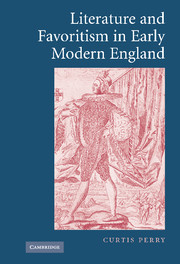Book contents
- Frontmatter
- Contents
- Acknowledgments
- A note on texts
- 1 “Prerogative pleasures”: favoritism and monarchy in early modern England
- 2 Leicester and his ghosts
- 3 Amici principis: imagining the good favorite
- 4 Poisoning favor
- 5 Erotic favoritism as a language of corruption in early modern drama
- 6 “What pleased the prince”: Edward II and the imbalanced constitution
- 7 Instrumental favoritism and the uses of Roman history
- Afterword: “In a true sense there is no Monarchy”
- Notes
- Index
1 - “Prerogative pleasures”: favoritism and monarchy in early modern England
Published online by Cambridge University Press: 22 September 2009
- Frontmatter
- Contents
- Acknowledgments
- A note on texts
- 1 “Prerogative pleasures”: favoritism and monarchy in early modern England
- 2 Leicester and his ghosts
- 3 Amici principis: imagining the good favorite
- 4 Poisoning favor
- 5 Erotic favoritism as a language of corruption in early modern drama
- 6 “What pleased the prince”: Edward II and the imbalanced constitution
- 7 Instrumental favoritism and the uses of Roman history
- Afterword: “In a true sense there is no Monarchy”
- Notes
- Index
Summary
From the appearance, in 1584, of the enormously popular libel known as Leicester's Commonwealth to the assassination of the Duke of Buckingham in the summer of 1628, hostility toward seemingly all-powerful royal favorites played a central role in the development and articulation of anticourt sentiment in England. Even after Buckingham's death, royal favorites continued to loom large in the English political imagination, providing a convenient shorthand for corruption and tyranny in numerous plays, poems, and polemics composed and circulated during the personal rule of Charles I. This heated and ongoing controversy over the institution of royal favoritism functioned during this entire period as both an arena in which deep-seated political and ideological concerns were contested and as a crucial symbolic vehicle for their public expression.
The sentiment behind the period's interest in favoritism comes across loud and clear in the remarkable title given to one of Sir Dudley Diggs's speeches from the parliament of 1626 as reprinted in 1643: A speech delivered in Parliament concerning the evill consequences that doe attend this state by committing places of trust into the hands of court-favourites wherby it doth plainly appear to be the originall of all publick grievances and combustions of this kingdom. Behind this extraordinarily sweeping claim about the significance of court favoritism lies the fact that thinking about royal favorites inevitably meant thinking about the uneasy intersection of the personal and the public in a political system traditionally organized around patronage and intimacy.
- Type
- Chapter
- Information
- Literature and Favoritism in Early Modern England , pp. 1 - 21Publisher: Cambridge University PressPrint publication year: 2006



